#Utena being… Utena. where there is not a single character who’s not a mess of dysfunction and internalized queerphobia
Explore tagged Tumblr posts
Note
Top 5 anime you think are criminally underrated!
This is a really good question, and it was VERY difficult to keep myself to only 5. These are all anime that I think deserve a much wider viewership! (Plus five more!)
I ended up spending waaayyyy longer on this than I thought, I can’t imagine how much I would have written if you’d said top 10. I can literally talk about anime forever. Here’s some I wholeheartedly recommend.
1. Shojo Kageki Revue Starlight (Action, drama, romance)
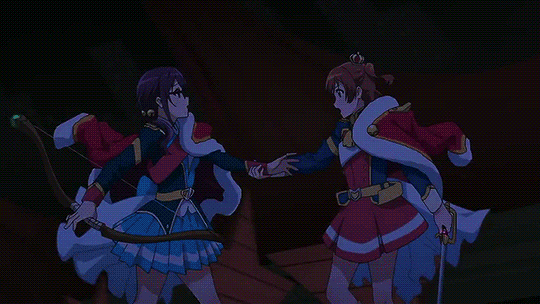
This is my newest love, as of yesterday, when I binged the whole thing. The best way I can describe it is by mashing up other anime. Take Revolutionary Girl Utena, iron out about three layers of metaphor, and trim off all of the dark themes related to the Rose Bride. Then throw it in a blender with Madoka Magica and Love Live!, add half a cup of Gay Concentrate, and serve up the result: A character-driven drama about girls at a performing arts school, who settle their differences in magical-girl-fantasy duels styled as impossibly gorgeous theatrical stage-combat musical numbers. Beyond the flash and high concept, there’s a well-written cast, solid emotional core, and really engaging plot.
2. The Eccentric Family (Drama, comedy)
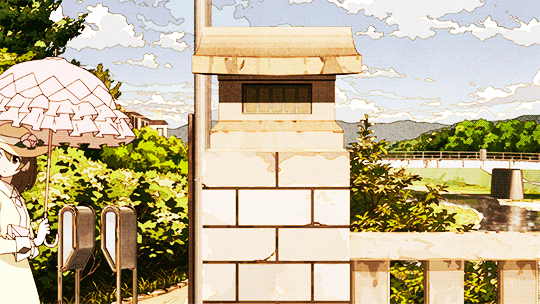
This show is my favorite genre of fantasy; mythical creatures living in the modern world, right under humans’ noses. In this series, humans only know tanuki as the cute little raccoon-dogs, but tanuki are really sentient shapeshifters whose goals are to outsmart the humans who live in the cities, pester the tengu who rule the heavens, live a life of freedom and trickery, and not end up on the inside of a hunter’s trap. The story follows a family of a mother and four sons whose widely-respected father was killed to end up in a human’s hot pot, as they try to enjoy their lives, live up to his imposing reputation, and unravel the increasingly suspicious circumstances of his death.
I have called this one “deceptively light-hearted” when describing it. My friend got halfway through the first season and came back to me with the verdict, “consider me fucking deceived.” This show has weight and does not pull its emotional punches, but neither does it ever stumble into becoming grimdark. Its worldbuilding is solid and the characters are all fantastically developed. Plus I wrote a whole post about one of the main antagonists(?) who I hadn’t even mentioned here.
3. Dennou Coil (Mystery, sci-fi)
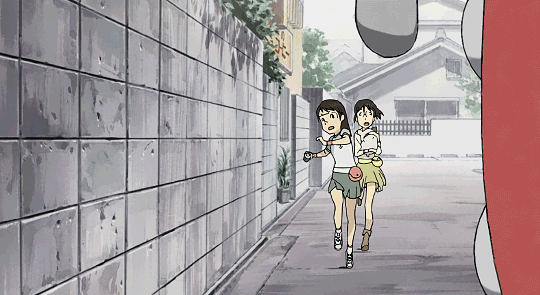
Dennou Coil is a masterclass in worldbuilding, in my opinion. It’s a near-future sci-fi world, basically if Google Glass had taken off and become as common as cell phones are today. Many people don’t see the real world, they see the virtual textures of the world as they’re rendered through the glasses. Kids in one city have learned to mess around with codes, collecting tradeable fragments that break off the edges where the system glitches, chasing viruses that hide in pockets of obselete code in abandoned areas of the city where the software doesn’t get updated often. They spend their time after school saving virtual pets from being accidentally deleted by the city’s antivirus, trading tall tales about kids who get caught by the antivirus and get their glasses bricked, and spinning urban legends about ghosts waiting just behind anything that’s visibly rendered, waiting to steal kids when they least expect it. Every detail they introduce is critical to laying the foundation for the mystery that forms the show’s plot.
Everything about this world feels real in a way I’ve never seen in a sci-fi anime. It’s all grounded in a clear understanding of programming, and lives by show-don’t-tell. The stakes aren’t life-and-death; the kids tagging glitches like graffiti to distract the city’s antivirus software are only at risk of ruining their glasses, at least at first. The plot and escalation is perfectly-paced, and the mystery is so satisfying to piece together as it unfolds.
4. ID:Invaded (Sci-fi, action, thriller, murder mystery)
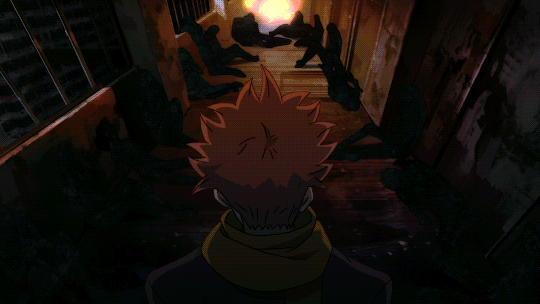
This show is like Psycho-Pass meets Silence of the Lambs. To catch a serial killer, you need to think like a killer, and nobody does that better than killers. A contraption called an “id well” can manifest an uncaught killer’s unconscious mind as a bizarre, unique, deadly terrain driven by stream-of-consciousness, and convicted murderers turned “detectives” dive into these wells to try to solve the mystery each well presents and discern the identity of other killers before they can strike again.
This show is a tightly-written, perfectly paced, edge-of-your-seat thriller. The two layers of mysteries inside and outside of the wells balance high-octane, big-screen action with tight, tense realism. Plus the soundtrack is an absolute banger.
5. Ping Pong the Animation (drama, sports)
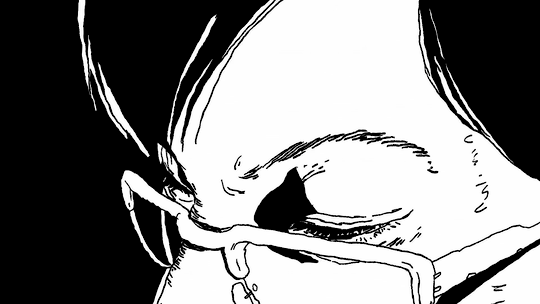
Imagine if I told you that there was a show that, in 11 episodes, unpacked how patterns of relationships are repeated across generations, how the tradeoff between talent, practice, and who you are outside of your achievements can scar the spirits of kids, and what it feels like to wrestle with the tension between your core understanding of yourself and how others expect you to be. Imagine if I told you that every major character goes through massive restructurings of their fundamental sense of self and how they see others, and that every single arc comes to a well-rounded and satisfying end. Imagine if the animation style pushed the limits of both realism and absurdity, landing somewhere between rotoscoping and caricature, pushing the impact of action and stretching the character’s expressiveness without betraying faces that are animated like real human people. Imagine that it had a dub so fantastic that it sits next to Baccano and Cowboy Bebop in my mind, shows where the cast threw themselves into their roles with their whole hearts.
Now imagine that I told you that this story is told in the context of high schoolers playing ping pong, and that it’s arguably the best show I’ve ever seen. Go watch this show.
#my posts#my asks#anime recommendations#shojo kageki revue starlight#the eccentric family#dennou coil#id:invaded#ping pong the animation#i understand that the obvious answer includes baccano but everyone who follows me knows abt it by now#ones that almost made the cut:#acca-13 and Sora no Woto and Stars Align#and Princess Jellyfish and Sarazanmai and Kakushigoto#yupuffin
1K notes
·
View notes
Text
Binge-Watching: Revolutionary Girl Utena, Episodes 4-6
In which I consider the curse of too much dramatic irony, Nanami toes the line, and Miki proves a compelling case study in good intentions gone awry.
A Familiar Foe
One of the defining staples of Ikuhara’s work is that his characters never know as much as they think they do. They construct grand narratives in their minds justify their place in the world- I’m fated to marry this person, this world is cruel and I must be cruel to survive it- but they’re based on false assumptions about what’s actually going on. Their crush doesn’t actually love them back, their situation isn’t as hopeless as they thought, the people they trusted turned out to be untrustworthy, and the values they believed in reveal themselves to be based on lies, often perpetuated by oppressive systems that rely on those lies to stay in power. The characters act believing the world is exactly as they imagine to be, only to run into trouble when reality refuses to conform with their fantasy. And I find this is the part of Ikuhara’s work I struggle the most with. Often, the audience is aware of the characters’ blinkered perspective long before they are, so we spend a lot of time watching the characters make mistakes that are obvious to us, but not to them. Ikuhara relishes in this dramatic irony, and at times, it’s more than is healthy. You can only watch a character make the same mistakes so many times before you start getting frustrated at them for not learning the goddamn lesson already. And considering Ikuhara’s characters often make some... really uncomfortable choices in pursuit of those fantasies, my sympathy well can run devastatingly dry if things go too far.
To explain what I’m talking about, let’s lose Nanami as an example. Her deal is that she’s a drama queen who sees herself as the school’s Top Bitch, making the most fittingly petty, melodramatic assumptions about whatever situation she’s in. She tries to ruin Anthy’s reputation by spreading rumors about her philandering and trying to peg her as a weirdo, and she over-reacts to the possibility of her brother being out to kill her despite such a thing having pretty much zero chance of being true. She casts herself as the Mean Girl who tries to mess everyone else’s lives up for the sake of her crush, complete with the classic haughty ojou-sama laugh. Of course, she really has no idea what she’s doing, and the world keeps foiling her attempts to play the part. Turns out Anthy’s not shy about being a weirdo and her friends are all okay with that, the rebound boyfriend she thought she was using to get back at Kiryuu was really the one putting her in danger in the first place, and the world just isn’t set up to reward her kind of pettiness. But because she’s so stuck in that fantasy, she keeps butting heads with reality as she tries to bend it to her will, only to get slapped in the face every single time.
On the one hand, that can be funny! Anthy’s escalating reveals of just how many animal companions she’s carting around were great (”Oh, that’s where Mr. Mongoose lives.”), and I absolutely love how the show’s really letting her be weird and a little neurotic to establish she’s a far more interesting person than her stifling role as the Rose Bride. Turning her notebook into one of those moving-picture flipbooks and giggling as she flipped through it for her own amusement? Christ, that was wonderful. The longer this show goes on, the more it’s letting Anthy relax into being her own person, just as low-key kooky and personable as her more expressive friends. She hums to herself in the garden, she eats shaved ice for dinner (and when called out on eating such unhealthy stuff, she wonders if takoyaki- another festival food- would’ve been a better choice), she spaces out and just watches a metronome tick back and forth for minutes on end. She even breaks her unspoken rule of impartiality in the duels for the first time, cheering for Utena’s victory against Miki when before she just stood back and watched silently. It’s really great stuff, and I love how understated her development has been thus far. So I appreciate Nanami for helping facilitate all that, if nothing else.
On the other hand, the joke gets obvious fast, and Ikuhara’s tendency to repeat moments almost beat-for-beat very quickly drives it into the ground. “Girl jumps to wild conclusions that obviously aren’t true and turn out to be not true” is not a joke you can repeat as infinitum without shaking up the formula and putting new twists on how it plays out. And her whole romantic situation is just... well, it raises concerns. Being in love with her brother is enough of a bad-taste red flag on its own, but also her rebound boyfriend is an elementary schooler whom she manipulates into doing her every bidding with no regard for his own feelings. But then again, that elementary schooler is also a bit of a jackass who puts Nanami in danger so he can be the heroic savior and “steal” her from her brother, so both of them are technically preying on each other at the same time and neither of them is presented as being in the right for doing so. So it’s a discomforting situation where both sides are doing bad shit that trends into manipulative territory, but they’re also not really punished for it and they end the episode not really having recognized the mistakes that got them in this mess in the first place. It makes me think about Ringo from Penguindrum, who was so dead-set of marrying her teacher she outright tried to rape him, and then she didn’t even learn her lesson for another few episodes. And I can’t help but wonder if Ikuhara doesn’t really understand how bad some of the things his characters do are.
Let’s Go in the Garden
That being said, you know where this does work really well? Miki’s character. Episodes 4 and 5 dive into the student council’s resident pretty boy, and the resulting character study is an excellent summation of everything Utena’s going for. Miki’s love for Anthy comes from her piano playing; she reminds him of when he and his sister used to play the piano in the garden when they were kids. It was just the two of them playing together, young piano prodigies without a care in the world. But then, Miki tried to make their private concerts public, and an unfortunate breakdown scarred his sister so badly that she never touched a piano again. And it was only when they stopped playing together that Miki realized how much he missed her playing. In his memories, the music of their shared time become something magical and miraculous, a beacon of light he could never recapture no matter how talented he became himself. Only Anthy’s playing inspires that same feeling from him, taking him back to a time when everything was perfect. So he wants to protect her playing whatever the cost; he couldn’t bear the suffering of losing such beauty again.
But by the time this mini-arc is over, we realize there’s more to the story than Miki was admitting to us- or himself. It turns out, his sister was never good at piano at all! She was only ever an amateur, and Miki was a prodigy good enough to cover for her parts. So that beautiful music Miki dreams about from their childhood was never even his sister’s playing in the first place; it was his own. The only reason he attaches to much value to it is because it represents the bond they shared. And while they’re not exactly on bad terms these days, they don’t really have much in the way of a relationship. Miki attaches so much symbolic value to the idea of her piano-playing that he has no idea how to connect with her as a person once they no longer share that particular pursuit. She’s his idol, his saving grace, his muse, his inspiration, his glimmer, his reason to keep living... but she’s sure as hell not his sister, even if he doesn’t realize it himself. He valued her for what she could do, not who she was. And once she could no longer do what he valued her for, he fell into a slump until he found someone else he could project that meaning onto. And with the pain of “losing” his sister still fresh in his mind- she’s even sleeping with Kiryu, to make the uncomfortable “I no longer own the woman in my life” undertones even more explicit- he’s taking no chances on letting Anthy slip through his fingers the same way.
What ties it all together, though, is that Miki isn’t really a bad person. Part of him does genuinely want what’s best for Anthy! He doesn’y want to fight for her because, like Utena, he doesn’t want to control her. When he overhears Utena once again reject the idea of the Rose Bride system and the dehumanization it represents (”I can’t forgive a system that deprives someone of their personal freedom!” THAT’S MY GIRL), his first instinct is to try to use his privilege, if you will, to tear down the system himself. All he wants is to protect her music, and that makes him willing to challenge the system he’s a part of if that system poses a danger. But because of that underlying possessiveness he’s not fully aware of himself, Kiryu’s able to take that anger and channel it right back at Utena. As long as the Rose Bride exists, he says, she will be beholden to the whims to her betrothed. The only way to make absolute certain her partner tells her to stop playing music is to become her partner himself. And just like that, his attempt to overturn the system is redirected right back to serving its needs. Because as long as he can imagine he’s doing it to “protect her,” then he doesn’t have to feel shame about upholding the power structure endangering her in the first place. Because as long as he can protect her music, he can put aside the issue of her lack of personal agency. Because once again, what Anthy can do is far more important to him than who she is. It’s only when Anthy calls out Utena’s name- right after Miki was psyching himself up by imagining how much Anthy was counting on him, I might add- that he starts to realize the disconnect between what he thinks is best for her and what she actually wants. But he’s got a long way to go before that tension fully settles.
Odds and Ends
-Wonder what Miki’s stopwatch is all about. Is he timing how quickly he revises tests or something?
-”You’re taking a make-up test too?” “Uh... well... yes.” sdkjfhsdkjfhds this show’s faces are god-tier
-Good lord, this music is beautiful.
-Wooooow, that was a shot with only the windows illuminated in utter darkness.
-”Uh, Captain? We sprung a leak.” Okay, I still don’t trust these shadow puppets, but those drowning noises were hilarious.
-”Her policy is not to get her own hands dirty.” Well, at least they’re honest about it.
-”Someone may be trying to kill me!” *smack* ...well then.
-”Forbidden love...” “No one asked you.” HOLY SHIT THAT AWKWARD SILENCE I’M CACKLING
-...I just got the weirdest Mine Turtle flashback from the harmonizing rejected lovers. Wow.
-Also how the fuck did you set up that recording studio so fast
-”Runaway kangaroo!” What even is this episode
Man, this show’s giving me a lot to talk about. Nothing less from Ikuhara. See you next time!
10 notes
·
View notes
Text
Totally Normal Boy watches Neon Genesis Evangelion
It was starting to get really annoying having to tag every single post I made for my Eva liveblog, so I’m going to start putting all my hot takes together in one post. Check out all my hot takes on episode 4, Rain After Running Away, underneath the cut!
This might sound weird, but the intro for this show makes me think of a combination of the Sarazanmai intro and the Rose of Versailles intro. That probably makes sense since it came out in between both of those shows.
We start off this episode with Misato being an extremely relatable hot mess.
The scene where Shinji is being emo on the train is really well done. The (mostly) still images of the crowded train with Shinji’s tinny music playing in the background really shows how isolated he feels from the world around him. I just want to give the poor kid a hug.
It’s hard for me to tell how Shinji feels about seeing the couple being intimate with each other in the movie theater. Is he disgusted? Is he sort of into it? Does he feel anything at all? I don’t really know.
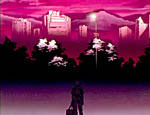
Oh, wow. This got real trippy, real fast.
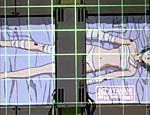
It seems like the show is trying to draw a clear parallel between Rei and Shinji with the way that they had Misato talking about how Shinji was fourteen while showing Rei’s bandaged body onscreen.
When I first started watching this show, I was worried that Shinji was going to be sort of a boring protagonist, but I’m actually really connecting with him.
The scene with Kensuke and Shinji in the tent together really highlights how different Shinji’s life is from all of his classmates. Kensuke thinks war is all fun and games, while Shinji has already been hardened by combat.
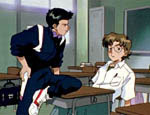
Yay! Toji is back! I liked him in the last episode!
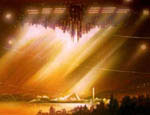
Aaaand he’s gone again. After only 30 seconds on screen. Oh well, it looks like this is going to be exciting, so I’m not mad.
Misato’s line about how “what others think doesn’t matter!” is the exact opposite of Anthy’s line at the end of the Keiko’s duel in the Black Rose Saga where she says that it doesn’t matter how people really feel if they doing something for someone they love. (Yes, I did just make a random connection RGU without expanding on it whatsoever. No, this will definitely not be the last time I do this.)
On one hand, I can’t be mad at Shinji for resigning. He shouldn’t have to make himself miserable like that for the sake of others. But I don’t want to Shinji’s scary dad put Rei in the Eva either. Can’t they find someone who ISN’T A LITERAL TEENAGER to put in the giant war robot?
TOJI IS APOLOGIZING TO SHINJI! THIS IS NOT A DRILL! I KNEW THAT I WAS RIGHT ABOUT HIM BEING A GOOD! I love how he needs Shinji to hit him back in order to feel better about himself. He’s literally so wonderful. I hope Shinji starts to become friends with him and Kensuke.
POOR SHINJI! He thinks that he’s a coward and a weakling. I don’t think that’s true since any teenager would be scared to be in a situation as terrifying as the one that he’s in. It makes me sad to see him holding himself to such high standards, since that’s something I do a lot as well.
Okay, so the Hedgehog’s dilemma from the title card is that “the closer they get to each other, the more that they hurt.” That’s not making me optimistic about there being any chance of Shinji just being able to be happy and have friends, even if its just for a moment.
This whole episode is sort of reminding me of episode 2 of Utena, when Utena almost purposefully lost her second duel against Saionji. I think it’s interesting how Utena is 39 episodes and she already got past this by episode two, while this show is 26 episodes and Shinji doesn’t have a moment like this until episode 4. This says a lot about the differences between how quick the two protagonists are to take action, and the differences in pacing that are a result of that.
I’m sure that there’s a very deep, important meaning behind all these cicada sounds but I can’t focus on that because they’re so darn annoying.
And the episode ends with us finding out that Shinji is not going to get on the train, much to the surprise of absolutely no one.
Final Thoughts: This episode didn’t really have as much as action as some of the last ones did, but it was still a decent episode. I’m having a really hard time getting used to the slower pacing of this show, but I really like a lot of the characters. Toji and Shinji are probably my favorites, but I really Misato as well I want to learn more about Rei.
I hope you all liked this liveblog format, because it was a lot easier than having to pause the episode every time I wanted to make a post.
#neon genesis evangelion#TNB watches NGE#ep 4: rain after running away#or is it the hedgehog's dilemma?#Netflix is telling me one thing#But the title card is telling me another
7 notes
·
View notes
Text
Anime Ramble: Puella Magi Madoka Magica
Magical Girl anime have this tendency to provoke a binary reaction. Either you see Magical Girls on the promo material and want to watch the show, or else you don’t. So, I’d like to preface this bout of gushing-about-a-show-that-I-watched by saying that your initial reaction to seeing the below poster should be discarded and you should just watch this show.
No, really, I think it’s safe to say that if you have an initial gut reaction of “I’m not interested” then you are probably going to appreciate this show quite a bit, while those who are avid fans of the Magical Girl genre might actually end up being put off by their expectations. Not because of what this show is, but rather by what this show isn’t.
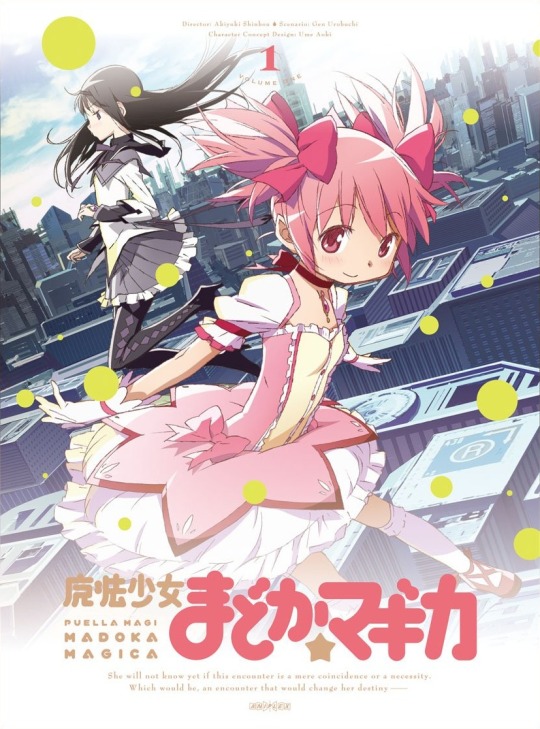
In the same way that everyone knows that Darth Vader is Luke’s father or that a certain noble from the North loses their head, there are some story twists which percolate into the general cultural consciousness due to sheer popularity and end up becoming common knowledge. Puella Magi Madoka Magica is a series which blew up to such popularity in 2011 that you’ve probably seen the characters somewhere before even if you don’t watch a lot of anime. You’ve probably also seen this little guy
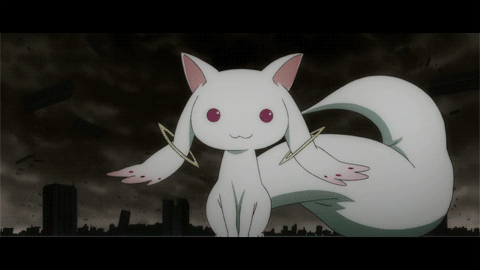
around, often in the context of memes in which either 1) he tries to get people to make a contract or 2) people inflict violence on him and his smug little face never changes.
So while I want to say that Madoka Magica will surprise you when it pulls a left turn into darkness and despair, not only have I just ruined that specific surprise for you but the internet at large more than likely already did that job for me. Not only was this show popular, which translates into a more widespread awareness of its overall tone and some of its twists, other more recent shows have pulled a similar deception. Only last year did we have Made in Abyss, which I haven’t seen yet but which I understand exists for the sole purpose of having cute kids set off on an exciting adventure only to be eaten alive by Uncle Lovecraft’s Happy Fun Time Cave. If you’ve been around the anime niches of the internet or, like me, have a former otaku for a sister then you know from the onset that this show is far more than meets the eye based on reputation alone.
To start with, take a good look at the promotional material for this show, such as the trailer. The production team did their damndest to ensure that from the outside the show would look like the most derivative Magical Girl show ever made, up to and including keeping Gen Urobuchi’s involvement in the production a secret. Gen Urobuchi (aka ButchGen aka The Urobutcher) is a writer who is known for being a bit of a downer, having been involved in projects such as Fate/Zero and Psycho-Pass. He’s very outspoken when it comes to his distaste for heroic archetypes played straight and his tendency to drag his characters through the mud, so his presence as the show’s writer was what you might call a dead giveaway.
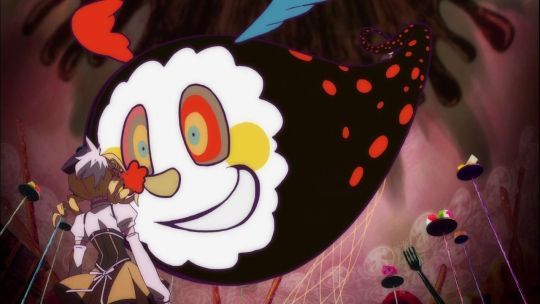
So what happens when a writer like this tackles a genre known for being all about hope, courage, and the power of friendship and love? There are many people who argue that Madoka Magica deconstructs the Magical Girl anime (Magical Girl Warrior subgenre) as codified by Sailor Moon or Cardcaptor Sakura. Some even say it’s the Neon Genesis Evangelion of the Magical Girl genre. As NGE showed us just how psychologically messed up a Giant Robot show would be if populated by actual human beings, Madoka Magica is about how having child combatants fight monsters in an urban environment with no support network does not make a well-adjusted childhood.
The effects of this kind of pressure and isolation on a bunch of adolescents is one of the elements of Madoka Magica, but fighting monsters with magic isn’t the only thing that makes a Magical Girl story. They’re traditionally as much coming-of-age stories as they are stories about definitions of femininity and self-determination. Madoka Magica has the trappings of a MG show: an all-loving protagonist, a dark and aloof rival, a tomboy friend, a non-magical friend, transformation sequences, fighting against the manifestations of dark emotions, and a cute(?) mascot. It’s talking the talk, but at its heart this is not a story about Magical Girl stories in the same way NGE was about Giant Robot anime (that’s what Revolutionary Girl Utena is for). It certainly plays with many common elements of the Magical Girl anime, but at its heart Madoka Magica is about hope, despair, idealism and selfishness. It’s a psychological drama and grand tragedy. It just happens to be wearing a Magical Girl outfit.
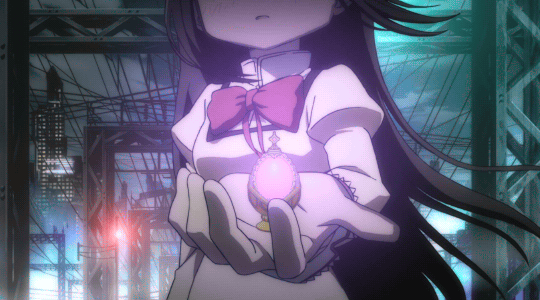
Which is not to say that one is superior to the other, of course. Just set your expectations accordingly if you’re already a Magical Girl fan. If you’re not, well, you might be in luck...
Twelve episodes isn’t a whole lot of time and Madoka Magica does a lot in those twelve episodes, so while I’m willing to spoil the tone of the story discussing the plot itself is a bit trickier. Kaname Madoka is our pink-haired milquetoast protagonist who doesn’t think she’s anything special, and just wants to make friends with everyone. We’re introduced to her via dream sequence, where she witnesses a dark-haired girl fighting against an enemy ravaging the city. A strange white bunny-cat creature asks Madoka to make a contract and become a magical girl, and then she wakes up. It turns out that when not dreaming of plot foreshadowing, Madoka has a pretty good life; a cool mom, a loving dad and good friends. But today it turns out the new transfer student at school - Akemi Homura - is the same girl from her dream. Homura warns Madoka to never change, to stay exactly as she is if she doesn’t want to lose her friends, family, everything she has ever loved. We wouldn’t have much of a story if Madoka never changed, though, so it isn’t long before the bunny-cat creature from the dream crashes into the narrative as well and introduces himself as Kyubey.
Kyubey offers Madoka and her best friend Sayaka an opportunity: make a contract with him and he will grant a single wish, any wish. In return the wisher receives magic powers and must now fight Witches. Not the pointed-hat, broomstick-riding variety, but rather strange, eldritch beings which bring about despair, death and suicide among ordinary humans. It sounds like a good deal: get magic powers and a superhero job on top of a wish? Who wouldn’t want that? But the catch is that this job is for life. If you’re spending all your free time saving the world, you’re not spending time with friends, getting a boyfriend, even just having fun. Is your wish worth dedicating your life to?
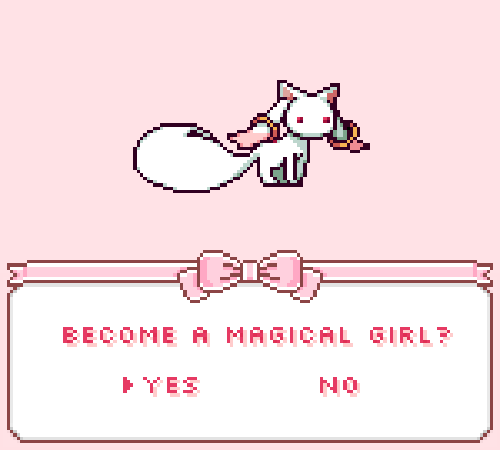
This story has a lot to say about good intentions. Our characters are living pretty good lives, so is there really anything worth giving that up for? Perhaps the wish is better spent on someone who needs it. But, remember, make a wish and you’re essentially fighting on behalf of that wish for the rest of your life. Is what you wish for really what you want, or do you really want some other outcome? Say you wish for a dying friend to heal; do you actually want them healed, or do you really want their eternal gratitude? All the characters in this story have the best intentions, but there’s a gap between intention and execution. If you don’t know what you really want, all the idealism in the world isn’t going to save you from your own regrets.
The phrase “I just wanted what was best” is a damning one. It's key to remember that the characters are adolescent girls, with all the contradictory vulnerability and immovable self-righteousness which comes at that age. It's the age at which ideas of how the world should be collide rudely with how the world actually is, and a person can either deal with it by changing themselves and developing coping mechanisms - healthy or unhealthy - or else break themselves on the impossibility of making their ideals fit with the system. Then again, it might be possible to change the system itself... but that’s a long shot.
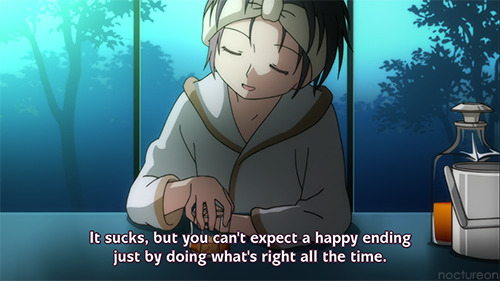
At one point Madoka’s mother gives her a piece of advice: if you see your friend hurting themselves while trying to to the right thing, maybe the best thing to do is to do the wrong thing for them to break them out of their self-destructive cycle. After all, they’re all still young, they’re at an age where recovering from mistakes is supposed to be easier than when you’re an adult. But this advice happens to come at the wrong time, because these kids are stuck in a situation where a mistake can cost one’s life.
As it happens the relationship between Madoka and her mother is one of the highlights in the series. Mom is a career-chasing businesswoman who still takes the time to talk to her daughter, and though she may not be working her dream job she’s living life on her own terms and is obviously an inspiration for Madoka. Her relationship with Madoka plays a surprisingly important role in the story, which is a refreshing change since parents are usually a non-factor or killed off for backstory purposes. The rest of the characters fit much more neatly into standard archetypes. Madoka herself has a big heart and wants everyone to get along, while her much more outgoing friend Sayaka is the go-getter who will take on problems head-first. We’re introduced early on to a much more experienced magical girl named Tomoe Mami, and she ends up taking a sort of big sister mentor role. All three of these girls believe in helping and protecting others, though each has their own take on the best way of doing so. Homura on the other hand is the dark and mysterious loner who for some reason is fixated on Madoka. We feel like she’s an antagonist, but another character who enters the story later turns out to be even more hostile. The red to Sayaka’s idealistic blue, this new magical girl feels like the antithesis to the magical girl ideals we’re used to: selfish, violent and hedonistic.

As elemental as each of these characters is, by the end of the story each one ends up in a very different place than where they started - or else had their starting position shifted altogether. Not everyone is what they seem. Homura’s backstory in particular hits like a truck when it finally arrives and ends up being key to the resolution of the plot. That said, Madoka Magica is not a story that goes in for particularly complex characterization. Its twelve-episode runtime forces a fast buildup and resolution. Friendships and other relationships don’t really have the time to mature on screen, and a lot has to be left to subtext or inference. Each character’s arc takes them where they need to go for the story to progress, and it’s not necessarily a bad thing. Some of these character arcs are desperately tragic tales of misunderstandings and misplaced idealism, but in the end these are still archetypal characters, though perhaps not the archetype you expected. Ultimately, they serve more as conflicting views on the show’s central themes than as the driving force of the story itself. The short length of the show is a weakness, keeping the story from being able to develop the cast as much as would have been ideal.
On the other hand, the show’s compact twelve episode structure is also its strength, and the ‘realism’ of the characters is much less important than what each one represents in the story as a whole. It’s hard to say whether or not Puella Magi Madoka Magica would’ve been able to hit as hard as it does if was any longer. This is a story very much focused on building its plot and keeping a steady pace, layering the tone and atmosphere and absolutely killing it in the aesthetics department. It is a straightforward story when all’s said and done, but it is densely constructed and cohesive. Every element of the show works as part of a whole and builds on the others, the visuals, the cinematography, the music, and even in the way the plot is structured. It’s got no time for cheap fanservice, it makes full use of every moment, and it only gets better on repeat viewings. This isn’t a show that supports casual viewing, and it expects you to be paying as much attention to the way a character is being framed in a shot as to what’s being said (or not said) in the dialogue. This is ultimately a simple story, yes, but it’s dense and constantly being told on multiple layers.
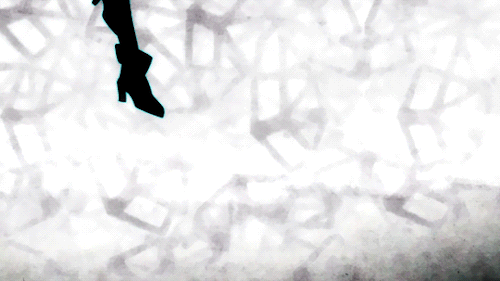
Puella Magi Madoka Magica’s ace in the hole is its mixed-media action scenes. Whenever our characters are fighting a Witch the show pulls a Terry Gilliam and starts doing very strange things with the animation. The medium of the art itself changes, with our cel-animated characters fighting against and among stop-motion objects. Paper cutouts and cotton balls. Lace and embroidery. The effect is unnerving and psychedelic and sometimes overwhelming. It can be difficult to follow the action whenever this happens, but then again these are supposed to be things that aren’t quite in sync with reality, beings which practically run on magic. The fact that these unreal things and spaces are being represented with real-world objects intruding into the animation is a clever touch. It’s an effect that I’ve rarely seen used in anime, and never in an action-heavy context.
(Author’s addendum: I’m aware that director Akiyuki Shinbo’s thing is this mix of visual styles. I do think its usage in Madoka Magica is still notable, if only because it works really well here.)
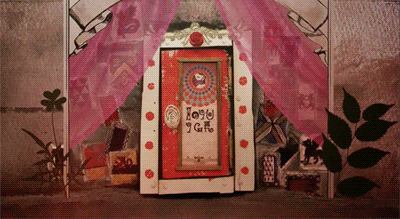
Even when it’s being more conventional Madoka Magica is visually accomplished. Even though the wide-faced character designs threw me for a loop at first (so wide!) they did eventually grow on me. There’s something about how the eyes look almost penciled-in which keeps them from straying into overly-cutesy territory. The cinematography is likewise superb. Strong, stylized color work drives home tone and emotion. The setting often dwarfs people within vast, empty cityscapes, the background itself being a reflection of the characters’ emotions and the series’ tone. In dialogue-heavy scenes we get momentary flashes of expression and action illustrating what’s happening inside a character’s head, and the framing of characters in a scene tells you everything you need to know about their relationships without saying a word. Whatever else you might think about Madoka Magica, it looks beautiful and tells much of its story visually through color, framing, light and shadow.
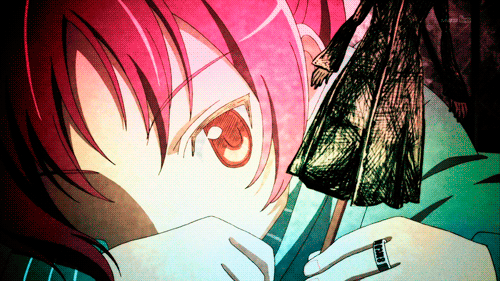
Going further than that, the structure of the plot is beautifully constructed as well. You could divide the story into four arcs of three episodes, each following the development of a different character, or else three arcs of four episodes, each one ending with a new point of no return. The third and tenth episodes mirror each other as well, each one shifting the stakes and giving us new context for everything which came before. The reason why this show shines so much brighter on a rewatch is because things that seemed like inconsequential melodrama or lazy writing the first time around take on a whole new meaning once backstory and motivation are revealed. It’s for this reason that I’m not terribly concerned about revealing Puella Magi Madoka Magica’s swerve into darkness; high stakes and dark subject matter are not the only secrets that this series has got up its sleeve. By the end of the story we’re not only dissecting the intentions and desires of our characters, we’re asking hard questions about why this story had to happen the way it did at all, questions which lead to what might be one of the most satisfying conclusions to an anime I’ve ever seen.
That is perhaps what makes Madoka Magica the show that it is. Though the ultimate shape of the story is straightforward, we journey there through layers of twisting color and twisting plot. Though we have our perspective on the events of the story constantly re-contextualized about once an episode, it’s always building to a conclusion that both feels inevitable and yet less likely the closer we get. And when the end does arrive, it takes everything that has happened so far, every mistake, every hope, every good intention gone wrong and it makes them matter. Though the ending is theoretically open ended, it’s entirely self-contained. It has introduced us to a new world, revealed the lies underlying this world, and has shown us what these characters do about it. It raises questions, and in the end tells us what it’s been saying all along. Few shows, anime or otherwise, use such a cohesive combination of visuals, narrative, and music to deliver a message. Beautiful to look at, beautiful to listen to, and beautiful in how it unfolds.
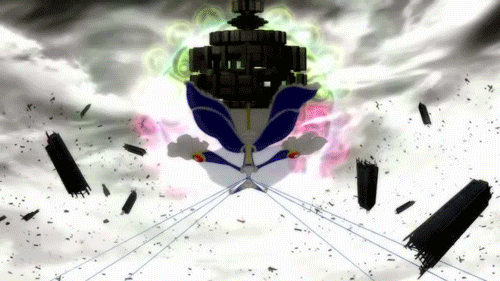
As it turned out, a sequel movie was made anyways. I refuse to provide any comprehensive thoughts on Puella Magi Madoka Magica: Rebellion for now, because doing so runs the risk of being flayed alive by the fandom no matter your take. Suffice it to say that it’s incredibly self-indulgent, visually stunning, and it will make you regret wishing that the ending of the original series could have been happier.
Puella Magi Madoka Magica is beautiful, and you really should watch it.
- Taihus, the wish-granting @raincoastgamer
(And I somehow manage to write all of this without actually discussing the soundtrack. The thing is, I don’t really know how to critique a soundtrack. It’s good, its use of leitmotifs is masterful and actually brought me to tears in episode 8, Magia represents the show’s true face behind the pleasant pink facade, and I’ve still got Sis Puella Magica stuck in my head.)
#puella magi madoka magica#pmmm#madoka magica#review#ramble#anime#anime ramble#anime article#anime review#I wrote a thing#gen urobuchi#akiyuki shinbo#studio shaft#aniplex#ume aoki#yuki kajiura
80 notes
·
View notes
Photo
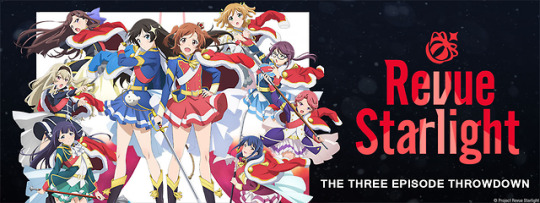
THE THREE EPISODES THROWDOWN Where we sing and dance to Luis Miguel’s AMVs.
Shoujo☆Kageki Revue Starlight
Yes it’s a Revue review, which isn’t quite a pun, since revue is indeed the origin of the word and both mean simply “see again”. Which would be a wise step before writing an analysis, especially for this series. TOO BAD.

Now, the other meanings of revue are that of “magazine”, perhaps because that’s what they were for initially, and in English, revue theatre consists of shows with several acts or a combination of several skills in an act, which is what most concerns the Japanese variety and thus, this series. The main inspiration for this work, in every sense, was the Takarazuka Revue company, the first all-female group focused on western stories, born at the beginning of the 20th century in contrast to the classic all-male Kabuki theatre, as a touristic incentive produced by the Hankyu Railways. Though not the original intention, this has obviously become iconic for many a women looking for empowerment and a sense of personal expression. Funnily enough, this line of theater developed in a much more cabaret-like fashion in South America, where the “teatro de revista” (magazine theatre) is usually a mix of lousy comedians and voluptuous women in skimpy, yet flamboyant outfits.

So this is what “dressed to kill” means.
Anyway, Revue Starlight is about a bunch of performer girls in training at a prestigious academy, where the usual Japanese intensity and group effort is compounded with the theatre’s competitive nature, all towards the Zero Position, the place in stage for the number one star… which is apparently still one who plays male roles. Japan. In particular we focus on Karen and her estranged childhood friend Hikari, who, as kids, swore they would become stars, then got separated for years while Hikari went to study at the best British academy, and now they reunite to fulfill or utterly mess up said promise.

I come to kick ass. From England.

Well, I’m the queen of bland, so there.
Production-wise… it’s spectacular. Design, animation, music, singing, it’s all top notch. There’s theatre imagery everywhere, there are creative uses of forced perspective, lighting, shadows, props… you name it. And it’s quite consistent so far, all the more so during the audition-fights, which are as dynamic and detailed as the best.

Truly a cut-throat industry.
But then there’s the most interesting, confusing, bombastic and fantastic element of the story, the underground revue. This are casting auditions, but also a rather dangerous tournament. They sing and dance, but also actually fight. This is the way the roles are determined, but it’s also a secret. This has every sign of being metaphoric, but the series makes it all too clear it’s absolutely happening for real. Everything else in the series is pretty much a realistic depiction of the struggles of theater training, except for this. I have to assume the idea here is that it works as representation of the feeling of theater itself, a land of contradictions. You compete with the people you share the stage with, you delve deep into the fiction of the stories presented, you confuse reality and fantasy at times, maybe? I should point out I know very little about any of this and I’m so very much NOT the intended audience for this. Also there’s a giraffe overseeing the audition tournament, because… yeah. I guess it’s a stand-in for a Kirin, which is a sort of good-luck fantasy creature. Or because the staff really like beer, dunno.
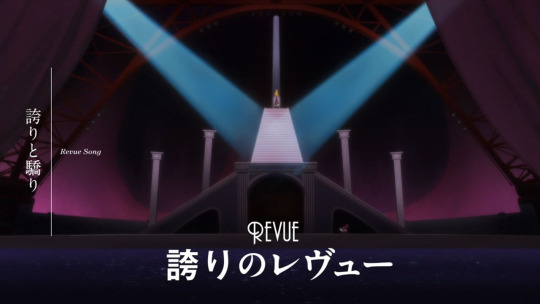
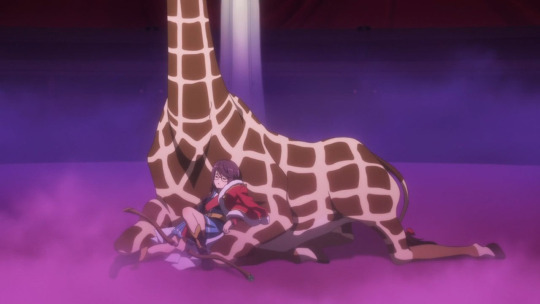
The other thing I should point out is that the director, Tomohiro Furukawa is a protégé of Kunihiro Ikuhara and worked extensively in Mawaru Penguindrum and Yuri Kuma Arashi. This is immediately apparent in the somewhat surreal nature of the audition tournament, very reminiscent of Ikuhara’s debut, Revolutionary Girl Utena, which itself was deeply influenced by the revue theatre, so you could say what goes around, comes around. The shocking use of color, music and a “transformation” scene full of mechanical action, all feel very much like the work of Ikuhara indeed. However, these elements and the place of this fantasy within reality are what worries the most about the future of the series. Even more than the fact that there’s not a single man in the series because it’s a Bushiroad idol production, so any interaction makes the fans combust. (I’M NOT KIDDING, LOOK IT UP)
As for the writer, it’s Tatsuto Higushi. Let’s say he makes very compelling ecchi. Have you heard of Cross Ange?
Why make it so very clear that the deadly auditions are happening, if there’s no way they are real? And why not show a level of reaction to this reality that corresponds to its fantastic nature? Why not show this world isn’t as normal as it seems in any other way than that? It’s a unique kind of uneasiness that also stems from the fact that both the realistic and fantastic sides of the story don’t just aim towards the same goal, stardom; but also involve almost the same skills, with the glaring exception of combat. And sure, in the end, the winner simply has to take out a button holding a cape, but it sure looks like they are trying to kill each other for the most part. Usually, fantastic elements work by either making sense in the context of the series or having an uncertain nature that makes it clear they are metaphors. None of those options quite apply. Also, I’m concerned that there’s very little symbolism in the “transformation” sequence, and it’s mostly just an spectacular depiction of the making of clothes and putting on makeup.
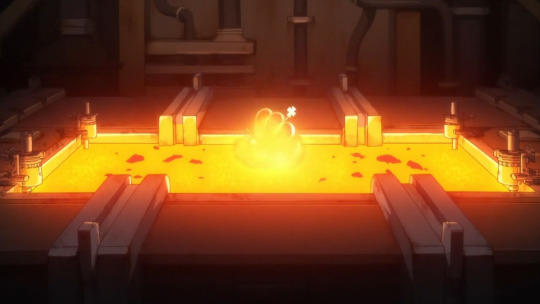


So, I guess I hope the series manages to become more compelling in both fronts, particularly in the interpersonal conflicts, since all the characters still feel rather stereotypical and the yuri overtones (probably not his fault, but hey, another Ikuhara staple) will probably amount to nothing relevant. The most interesting aspect, in the context of revues, is that Karen, the protagonist, wants to become number one to share the spotlight with… everyone. Or at least with Hikari. That would be a drastic change from the current and real system, and at least that’s a theme that seems like it will be explored in depth.

3 notes
·
View notes
Note
?!?! The Halloween costume version and the movie version Look Exactly Same. Why you got to be so unnecessary mean about this movie?
TBH I was thinking of the yellow dress, in this case -- I think MOAR PETTICOATS were desperately needed.
I do have to say, though, I don’t think anyone can really be “mean” about a corporate project. I’d never be as exasperated with something creator-driven. It’s when something with so much manpower and money behind it is allowed to proceed without resolving plot holes and without a clear and cohesive design direction that I feel intense frustration. I should note that this is endemic of the decade or so of Disney and Pixar films, I am just as frustrated with Frozen, Up, Brave and Tangled, but I don’t manage a blog focused on The Snow Queen or Rapunzel, so I don’t give it the same level of attention.
For personal context, being critical of media is part of my job. I’m a professional storyteller -- I hold degrees in animation and fine art with an English minor. I write for licensed Disney properties, I teach animation design at a college level. Being critical makes me a better storyteller, because it helps me to identify where things fail, and to hopefully take those lessons and apply them to my own work. Similarly, being critical of art direction makes me a better, more thoughtful designer.
What this also means is I am VERY critical. Even of things I deeply adore, and this is often confusing for people. A friend of mine thought I hated Howl’s Moving Castle because of my critiques of it, but it’s honestly a great favourite of mine. I can’t just enjoy a thing anymore. I have to dissect it, because I have to understand how and why it works the way it does.
That said, since the baby was born I barely get to sleep, let alone thoughtfully analyze films. I’ve reblogged snarky memes about it, but not really sat down to pick apart the thing point by point or really made much of a statement on it (perhaps it is those reblogs coming across as unkind?). I think ultimately, the live action BATB suffers because it tries to cobble disparate parts onto onto the near-perfect script of the 1991 film, and they simple don’t fit. Plot elements are introduced and dropped before reaching a logical conclusion, characterization is uneven and emotional beats miss their mark. Chekov’s gun is left loaded on the mantle. If the film had fully departed from the animated film and been its own thing, I think it could have succeeded (most of the Gaston scenes were excellent and fun, for example). If it had simply redone the animated film scene for scene it could have succeeded. In keeping one foot in both camps, it fails to be either and I think that is where my great disappointment lies. In lost potential.
Visually, I felt like there were too many things going on with the costumes that didn’t seem connected. The baroque stylings of opening sequence aren’t revisited later in the film, making it stand apart awkwardly. Belle’s costuming feels limp compared to fullness of other character’s costumes (MOAR PETTICOATS). CG creatures in general give me uncanny valley shudders in a way practical effects don’t. They move too fluidly and the weight always seems wrong. Again, this might be because of my training -- I spent years being graded on my ability to to see this and compensate for it. I don’t know what things look like to people who haven’t been taught to reverse engineer films and books. I’m not saying I can do better, I’m just saying I can’t unsee it.
Like I said above, I work on licensed properties. I know just how tied one’s hands are when it comes to legacy characters, and how frustrating it is to be told that you cannot do this or that. And those rules are constantly changing, depending on who is in charge. I have no doubt that the filmmakers themselves had a thousand hurdles and frustrations to overcome to arrive where they did, and I know that no single creative vision ever makes it to the screen intact. That’s why my feelings here are primarily frustration -- it could have been good, but it wound up a heap of mismatched odds and ends instead.
I am not telling you not to love it. Love it with all your heart. I have guilty pleasures aplenty (Labyrinth is a hot mess and I’ve seen it at least twenty times. The emotional core works. Suspiria makes no damn sense, but the design direction is, pardon the pun, to die for. Utena is all over the map but holy frig that third season twist!). Loving something doesn’t make it perfect or untouchable, but being flawed doesn’t mean there aren’t things to love. So i hope you wont confuse my criticism for cruelty, or my snark for serious commentary. It would be mean to speak thusly about a single creator’s vision, but it isn’t mean to do this to a giant commercial venture created by a corporate juggernaut. There’s nothing wrong with expecting more from a company whose bread and butter is, ostensibly, storytelling and cinema, and there is everything to learn by being analytical towards our media.
TL;DR: I’m disappointed that something with so much promise was handled clumsily. That yellow dress looks floppy.
100 notes
·
View notes
Text
end of the year writing meme 2k17
because i did this last year and i want to gloat over my truly embarrassing uptick in wordcount.
Total number of completed stories: 8 + 1 wip + 1 snippet. Total word count: 151,100, MOTHERFUCKER. Fandoms: voltron, persona 5, natsume’s book of friends.
Overall Thoughts
Looking back, did you write more fic than you thought you would this year, less, or about what you'd predicted? TOO MUCH VOLTRON. WAY, WAY TOO MUCH VOLTRON.
What pairing/genre/fandom did you write that you would never have predicted in January? i have 40k of lotor/matt sitting on my hard drive. it's going to break 60k after edits. i don't want this life.
What's your own favorite of the year? the post-series winter cult au was my favorite bit of writing, but i am gonna clutch the pseudo-utena pastiche (disclaimer: not actually related to utena in any way) to my chest all the more because nobody else will. 36K WORDS, MOTHERFUCKERS.
Did you take any writing risks this year? mmm. i've used the second-person pov before to varying degrees of efficacy, but the junior detective kurusu akira fic and the every day au were the first times i really tried to use it as a proper conceit -- a choice that related to the way the character wanted the story framed. ymmv on how well they worked (ha! ha! most of the second-person punch in the junior detective fic happens in the ~20k after the prologue, oh god, nobody even knows what i'm talking about). at the v. least, i still think the every day au's ending wouldn't pack such a punch from any other perspective.
Do you have any fanfic or profic goals for the new year? WRITE STUFF THAT ISN'T VOLTRON, FOR FUCK'S SAKE. i've been reduced to just clawing at doors hissing LET ME GO... LET MY PEOPLE GO ...
From my past year of writing, what was...
My best story of this year: definitely the post-series winter cult. people keep describing it as hard to get into, which, yeah, it is. but it's also the most polished piece from this year.
in general, my best fic is always still the dazai/yosano thing from 2016. i didn't even round out all the subplots for that one, but because it's a crack ship, the whole dynamic is something i made, and i think that earns it a place on the trophy shelf.
My most popular story of this year: the shrine guardian au, i guess? which is bewildering, frankly: it's very fluffy, but i don't see that it does anything better than my other works. not to be all lucille bluth, i love all my children equally!!! and its prose is fine, but i wouldn't call it a standout piece.
Story of mine most under-appreciated by the universe, in my opinion: it is a tie between my two big voltron aus -- i understand why the pseudo-utena flopped as hard as it did (60k worth of fic crammed into 36k, badly edited, had to cut two subplots and it still turned out a mess), but the darkest timeline auniverse fic was decent work with mediocre prose and a fuckton of worldbuilding. i'm this close to digging up a worldbuilding meme and answering all the questions that literally nobody will ever ask. THERE WAS SO MUCH TIMELINE BUILDING IN THAT ONE.
Most fun story to write: fun & joy are lies. all fic is suffering. only the motor fic came close, and that was awful in a different way: two characters with little established personality having to build chemistry and worldbuilding at the same time. fuck you both.
Story with the single sexiest moment: hilariously, despite the amount of porn i like to write, none of my fic's been personally sexy to me since 2013's mikorei pwp in which mikoto blew up some buildings and then convinced munakata to fuck him into a wall. what can i say, i'm an arson kind of girl.
Most "holy crap, that's wrong, even for you" story: nothing posted this year! but i'm gonna talk about my impending january posts because god, fuck, i'm not waiting a year so that i can talk excitedly about my 60k nightmare, i plan to be fucking burned out on voltron by february.
anyway: the first time i tried to explain lotor/matt to my best girl, she promptly texted back in horror: "DID YOU WRITE FIC WHERE LOTOR SOULBONDS MATT AND LEAVES HIM TO GET GANGBANGED." and, like. i want to explain, but the actual explanation wasn't really that much more comforting. so, there'll be that. i guess.
(there's actually no non-con involved! it's not even dubcon! IT'S NOT EVEN MATT WHO GETS LEFT.)
Story that shifted my own perceptions of the characters: the fucking motor fic. i knew what i liked about lotor as i was going in -- 90% of my motivation in writing it was "okay, i can't make any of the existing major lotor ships work for me, let's just throw this ridiculous spaghetti galra at a shipping wall and see what sticks" -- but matt was much more nebulous to me. i know fanon matt isn't all that far off from the matt we actually saw in season 4, but i was interested in someone who wasn't an older, cheerful, ingenious, meme-loving version of pidge. and the detail that i really got stuck on was the fact that he was a cadet when he went to kerberos, even though keith was the best pilot in his class and keith couldn't go. why?
obviously the simpler answer's "narrative convenience" and "why would anyone trust keith enough to send him into space with millions of dollars' worth of space equipment". but i really did want to play with the alternative too.
Hardest story to write: fucking god. the european travelogue was downright awful to get out. i think it's partly that there's an emotional density to it that isn't really present in my other fic, and partly that it's 25K OF SHIRO DESCRIBING ARCHITECTURE THAT IS PERFECTLY EASY FOR ANYBODY TO GOOGLE AND LOOK AT WITH THEIR OWN EYES.
i also found sheith particularly hard to build as a convincing slowburn. i have no idea how anyone does it. the ship's selling point, to me, is that keith would give shiro anything. if shiro weren't romantically interested, keith would live and die for him in every other way and be absolutely satisfied by that. i never write keith as secretly wanting more than shiro can give -- he'll do it by accident, when he misunderstands what shiro's capable of, but ultimately that's not what keith wants himself to be. shiro plays by the rules a little better, understands the risks + selfishness of dating someone only to leave them for a dangerous ten-month expedition -- but when it comes down to it, i can't write them as anything other than two people who understand each other at the baseline, where it counts. like, shiro may not actively acknowledge it, but i don't think he DOESN'T know that keith has no breaking point when it comes to him, and that there is very unlikely to be anyone else who could ever be what shiro is to him.
anyway: 25k of no-plot fluff! jesus! it was a fun little experiment, and i'm still amazed and delighted that anyone hunted my tumblr down to ask for fic. but i'll probably never write anything like that again.
Biggest disappointment: can you believe that i wrote 36k of psychic bonding fic and it didn't lead to telepathic porn? there's a lot in the utena pastiche that made me go "mm, not enough", a lot that was flatly messy first-draft fumbling, and i've never been happy about how it turned out, but that's still the biggest outrage to me. like. what was even the point. there's so much about it that makes me itch to rewrite, but the number-one reason that i never, ever will is that i'd have to find somewhere to fit porn to make it worth my time AND SOME THINGS ARE JUST IMPOSSIBLE.
Biggest surprise: i!! posted!! 100k+ words!!!!!!! WITH OVERFLOWING PUNCTUATION BECAUSE I DESERVE IT, MOTHERFUCKER. ficwise, though -- the lotor/matt au. why the fuck would you ship two characters who literally have no screen time together, share nothing in common, and are unlikely to develop a dynamic in future seasons, let alone this one? answer: ME: You have to promise to read the Lotor/Matt thing even though I've realised that their portmanteau is "Motor". MY GIRL: WELL now i have to read it ME: ME: Never mind, your boner killed mine.
but the joke's on me, because the one way to guarantee that i'll write something is a hot girl telling me she'll read it.
i love how most of this meme is grim self-encouragement to finish a fic that feels like it is literally killing me by dint of being the longest goddamn thing i've written in my life.
Most unintentionally telling story: well, it was GONNA be the junior detective kurusu akira fic, but i DIDN'T FINISH THAT.
on a more personal note: the every day au's ending was never in question for me. i'm rarely in the mood for conversation, but i can't stand keeping my feelings to myself: i don't feel real unless someone else can see me. it's why i like to yell in my post tags and do memes even though i follow like three actual personal blogs and a significant portion of this tumblr's designed to actively discourage 90% of people who stumble across it from adding me. the idea that, when you strip the viewer out, the object disappears -- that's probably as 'me' as a story gets.
Highlights + Wrap-up
Favourite Opening Lines (3):
The courthouse's a brushfire of camera lenses.
You wake up. [ ed. nt: not really the most unique or interesting of opening lines, but i've started to appreciate how this echoes throughout the piece and then builds into a clusterfuck chorus by the end. ]
[ nope. the other first lines weren't that great. fuck you, meme.]
Favorite 5 Line(s) Ficbits from Anywhere: [ ed. nt: fuck you, word limits & punctuation. ]
"I knew you were gone—long gone. No one could've called you back. But I just kept saying—if they were really Voltron, you'd be with them. You'd have come back for me."
"You stand," Allura whispers, "on territory that was consecrated by the five rituals of essential transference. You stand within the walls that my grandfather built, the walls for which my father sacrificed everything to keep from enemy dominion. The planet Altea remains because I lay claim to it, because I have not yielded to time and I will not yield. You may have served as Zarkon's witch; but in these halls, your very life hangs on Altea's mercy, my mercy. Either you'll remember an Altean's manners or a prisoner's—but so long as you speak to me, Haggar, you will choose one." -- so this fic was a series of dramatic triumphs that i did not build up to and therefore had no right to put in, but i don't care. if i'm going to write 100k++ of fic in a year, it's gonna be spread out over like ten different fics. and this is my favorite of the dramatic non-love confessional speeches that i wrote this year.
Keith lisps briefly and nastily under his breath. "Why would anyone pronounce an apostrophe?” <-- me throwing shade at a hundred years of scifi.
[ fuck you, listicles. ]
[ fuck you pt. 2. all the other sentences sucked. ]
Trivia left out of three fic:
pidge survives the events of the every day au and does eventually go on to form voltron. i left the fic where i did as a dramatic stopping point; in my head, i always knew where things were going to go afterwards. this clarity was helped in no small part because i had to immediately spill my guts to my best girl after she finished reading and realised in outrage that i'd given her a 19k fic in which her otp kissed zero (0) times. but yeah, everything works out -- albeit with a superdose of trauma -- and keith and pidge in particular have a moment which appeals to all my friendship kinks. i couldn't write the sequel in second-person, though, which is probably why i'll never do it. if i can't be pretentious and tragic, and i still can't work in any porn, then what is the point.
shiro, in the weird tattoo porn thing, has no idea of the effect he's having. in his mind, he's just being reasonable. this ties into my preference for writing s3-4!shiro as someone who thinks of himself as the same man who fell to earth a year ago, someone who has survived the galra over and over, someone who wants to lead in the war and deserves to do it. the trouble with this is that about one-point-five of those things are not necessarily things that the original shiro actually believes. i love this discrepancy between writing the two: there's one who buys into his own mythology of being a hero, and there's one who just wants everyone to survive and be happy and safe. in an ideal world (note: ideal to nobody but me), project kuron would be a thing where they created a perfect clone of shiro with all his memories but accidentally infused it with just enough galra beliefs about strength and the importance of war that it sabotages voltron's mission. that particular shiro doesn't mean to be fucked up, but his beliefs are, and he doesn't realise it until after the fallout of everything he's done hits the team. it's the entire basis for his behavior afterwards. this is one of those character development things that fell into the margins between the tattoo porn and its weird au sequel. i should have written the fic in between, i'm sure it would've been less confusing for everyone who read the goddamn sequence, but honestly, you could not pay me enough to write about keith and shiro's relationship falling apart.
this was never made explicit in the fic itself, though it seems pretty clear to me, but here goes. of the ten photographs, nine are pictures that shiro takes for keith to remember them by. the last is one that keith takes for shiro.
Lessons learned about writing in 2017:
when in doubt during edits, read the paragraph out loud. you don't have to do it very loudly, but people respond to something that flows off the tongue even if they aren't actually reading it out to themselves.
you're a niche writer. you write for you. that means you don't really have to edit if you're tired.
deadlines are bullshit. don't sign up for any more events featuring those.
with the way i write, there's always an element of mistrust. in my shorter fics, people are breaking up because they can't trust each other, or they're teetering on the brink of getting together -- but. in my longer fics, i really, really love to throw an unexplained element of mistrust into the mix (see: the fic where shiro leaves his own dimension and refuses to go back without any explanation) and only 'reveal 'it at the end. mistrust is an easy shortcut to tension. it's a good way to reframe the story, but it's also ... hm. predictable if it's literally all you write? i like to think that i'm capable of writing plots whose value isn't entirely based on the way they're told. i just need to let the story breathe once in a while.
the comma before 'too' is grammatically incorrect when that's the end of the sentence. my entire life is a goddamn lie.
there's such a thing as overdetail. a loose sketch and a twinkle of atmosphere will do better than three dense paragraphs detailing exactly where all the cathedrals are. my god, i never want to leave this continent again.
the best writing feeling is posting something and then tweaking all the small mistakes out of it. the second-best writing feeling is bringing someone you like a freshly-killed (read: edited) piece of prose, then demanding pets and cuddling for your great act of magnimity and courage.
looking back on my life, i should have been born a cat.
Fic-writing goals for 2018
post/finish all 80k of my existing drafts, THEN LEAVE VOLTRON FOREVER, I'M SO DARKLY EXCITED ABOUT THIS EXODUS.
seriously, write for any fandom but voltron. oh my god.
maybe i can just dive headfirst into ocean's eight and write a lot of bantery f/f until everyone forgets my embarrassing gay robolion phase.
a sci-fi au for nirvana in fire, heavily influenced by recent military scifi, in which (contrary to all the imperial death traditions) the chiyan army's memories and consciousness are ostensibly deleted from the imperial archives as punishment for their betrayal. several years down the line, jingyan finds his political influence rising with the advice of a helpful and very insistent ai advisor. IT'S TOO COMPLICATED AND I'M STILL THINKING ABOUT IT.
did you know that the natori/matoba section on ao3 has no explicit fic at all? like, zero. 2018 goals, baby. i don't care that nobody needs to know what horrible things they'd do to each other in bed. i'm gonna be this ship's rule 34, or the arsonist who burns down the house of the person who gets to it before me.
2 notes
·
View notes
Text
Dual Anime Review: Flip Flappers, Magical Girl Raising Project, and the Post-Madoka Magical Girl
The Magical Girl Raising Project is a popular social network game allowing people all over Japan to create their own magical girl heroes, fight monsters and collect points and items. But what most people don’t know is the game’s secret; if you’re lucky enough to be chosen by the admins, you can actually become a real magical girl, complete with enhanced physical abilities and extraordinary magical powers. So it is for Snow White, who takes it upon herself to be a force for good, while getting to know the many other magical girls throughout her city, some of whom are friendlier than others. All’s well and good, until the game’s mascot, Fav-pon, suddenly announces that he’s cutting the number of magical girls down by half...
Meanwhile, in a different show...
Cocona is a middle-school girl with good grades but low self-esteem or ambition. While she struggles to figure out what to do with her life, the eccentric wild-child Papika literally flies into her life and whisks her off to a wondrous and magical dimension known as Pure Illusion. Cocona soon meets the people behind Papika’s journeys, the mysterious organisation FlipFlap, who wants the two of them to travel throughout Pure Illusion and gather the Amorphous fragments said to be able to grant wishes. As they encounter ever more dangerous worlds and even more dangerous organisations, Cocona ends up finding out more about herself, and her own wishes, desires and past, than she could ever imagine...
So, I’m gonna do something different. On the surface, these are two very different shows with very different styles and approaches, and for the longest time I was debating on how best to tackle them. But honestly, despite how different they are they are both magical girl shows. And while there are massive differences between them, both of their approaches can both be tracked back to a single show which, for better or for worse, has completely reshaped this genre for the foreseeable future.
That would be the 2011 show, and my personal favourite, Puella Magi Madoka Magica.
There have been loads of magical girl shows throughout the years, some of which have made their way over to our kid’s TV channels, and some which are lying on the back half of obscurity. Pani Poni Dash, Cardcaptor Sakura, Magical Knight Rayearth, Magical Girl Lyrical Nanoha, and of course, the many many incarnations of Sailor Moon. The main premise is often similar; an average Joe schoolgirl comes across a magical power and becomes a superhero, fighting for justice and looking pretty at the same time. She often gathers a series of friends with their own powers who support her and follow their own storylines, and the stories tend to focus on the power of friendship, positive attitudes and actions, and just generally being a nice person. Yeah, it sounds corny, but honestly as kids’ shows go they range from harmless to actually quite exciting; I remember really enjoying Cardcaptors back in the day (despite the questionable dubbing) and frankly the stories told could be just as epic or intense as your normal superhero show. The magical girl genre was no stranger to dark stuff, or complex stuff, as can be seen with Princess Tutu or Revolutionary Girl Utena. It is, after all, a genre like any other, and you can do what you like with it.
But then came along Madoka Magica, and suddenly, to the anime-creating masses, magical girls could suddenly be a new and unexplored territory.
Madoka Magica took the genre and flipped it on its head. Whimsical fantasy gave way to brutal reality, the power of friendship gave way to the flaws of human nature, and the bright, pastel worlds suddenly seemed far more dangerous and foreboding than they’d ever been before. Whether you like the show or not, there’s no doubt that it did for magical girls what Evangelion did for super robot shows. Madoka Magica has become an icon, and ever since, magical girl shows have and will be judged by that standard, whether unfairly or intentionally.
There’ve been a few definite attempts to cash in on Madoka’s popularity in the ensuing years. Day Break Illusion was one of the first, coming out in the summer of 2013 to the raucous sound of people not caring. Whereas Madoka was subtle in its approach, Day Break Illusion was a blatant attempt to be ‘dark and edgy’ just because Madoka did it. Of course, as I’ll explain later, that doesn’t necessarily make it a bad show. No, it’s the bad cliche characters, terrible plot twists, lack of focus, contemptible fanservice, 2deep4you attitude and general messy aesthetic that makes it a bad show. But I digress.
There have been other notable ‘post-Madoka’ works throughout the years as well, including Wixoss and Yuki Yuna is a Hero, both of which I’ve heard mixed things about but sadly have not seen yet. I daresay there have been others as well that have slipped under the radar. But the point is, magical girls have not gone anywhere, as is evident from the two shows that came out last season. But even though Madoka is over five years old now, its influence isn’t going anywhere either.
In some ways, this is utterly obvious, as can be seen with the first of these shows, Magical Girl Raising Project. Now, this is actually an adaptation of a light novel that was published in 2012, only a year after the release of Madoka. I can’t and won’t say whether the novel itself was directly inspired by the show; there may have been enough time but I daresay the idea was there before Madoka came out. What I can say though is that even if the novel is definitely not inspired, the anime certainly is.
Let’s take a break and mention the production, as I usually do at the beginning. The studio behind this is Lerche, probably most famous for Assassination Classroom and DanganRonpa the Animation. The look of the show pretty closely follows that formula; it’s...decent. Characters are always on model, but often look a little stilted and wooden. The animation is good but nothing spectacular. The direction is very by the books and straightforward, but at the very least it’s not bad. Just unambitious. The music is the same; the pieces do the jobs they’re supposed to, and are never particularly standout or particularly distracting. It’s weird how mundane the production feels considering how dark and brutal the subject matter gets, and honestly I think that works against the show; it’s one thing to pretend the show is all happy-clappy and jolly and then hit the Sudden Dark Turn button, but if the show’s already kinda muted and, let’s face it, bland, the brutal twists don’t hit as hard.
And yes, this show is brutal. Whereas Madoka is sort of ambiguous until the infamous episode 3 (and even then, is nowhere near as dark as some people like to make out) MagiPro gives you only one episode of Shiny Happy Funtimes before it hits you with dark twist after dark twist after dark twist. The fights are brutal and bloody, the characters are pushed to their limits, and just when you think it can’t get any more messed up, you get proven wrong the very next episode. This show is utterly vicious.
Normally, this would put me right off. Vicious and brutal for the sake of vicious and brutal can very easily come off as tasteless and offensive if done even vaguely right (see: Elfen Lied), and utterly laughable if done wrong (see: Mirai Nikki). I was ready to go into this show and tear it a new one; I had virtually no expectations. But the funny thing is...it works. As much as the production is bland, the actual story itself has a heck of a lot of thought put into it. About four episodes in, I found myself really enjoying it, and wondering where it was going to go next. I was interested. I was excited. It was trash, but it was lovingly crafted trash, and such trash demands my attention.
There are a couple of reasons. Part of that is the characters, although not because any of them were particularly deep or complex or anything. They were just fun. Some very unique designs, and all of them had unique personalities, stories and interactions. It certainly helped that, although Koyuki was supposedly the main girl, the show actually gave sufficient screentime to...pretty much everyone now I think about it. The balance is just right, with the slightly more troubled characters staying around for longer and ‘leaving’ just at the right time. It wasn’t perfect (I’ll get into that in a minute) but it was far better handled than, say, Mirai Nikki, where half of the ‘contestants’ had barely any screentime, character, or both. And there were 16 magical girls (plus Fav-pon) mingling around here, and only 12 episodes to do it all in. I’ll admit, that’s impressive.
That’s the other thing though; the pacing was absolutely spot-on. Right from the get-go, the stakes were there, and you got to see what everyone was up to. It’s hard to describe how essential good pacing is to storytelling, but MagiPro is the show to bring up as evidence for why. Even at its trashiest, the handling of the story itself was really rather masterful. And that’s the other thing; the show was very self-aware. Not in the way that it was constantly turning to the camera and making 4th wall jokes, but rather that the tropes that usually come up in these things kinda did...but then got twisted around at the last second. If I were to give you all of the characters at the beginning of the show and ask you to guess what happened, chances are you’d make a few wrong guesses. As I said, the characters themselves aren’t particularly complex, but the way they’re used feels fresh and new. For the most part.
It’s easy to see the influence from Madoka Magica here, but does it actually work as a successor? In many ways, it gets a lot of things right. It takes the Dark Magical Girl tone and plays around with it, making a show that is actually entertaining, which is always a good start. And of course, it’s far darker and more brutal than Madoka ever was. So is this really the second coming? Eeeh....no. Not really.
For a start, MagiPro has problems. And when MagiPro shows its problems, it really goes downhill. Whereas most of the characters are handled well, one or two really miss the mark. There’s a character called Top Speed who, while a fun character in her own right, has one of the most predictable and hammered-in ‘stories’ I’ve ever seen. They try, lord knows they do, but it’s really difficult to feel any sort of emotional attachment when all she’s doing is spouting clumsy foreshadowing. And where she gets a bit too much, there are a few girls who really don’t get enough, especially with all the build-up some of them get. There’s an attempt there, and most of them get backstories or context (albeit often quite clumsily), but there gets to be a point when they really don’t have much reason to be there.
And that’s the biggest problem with MagiPro; for all of its clever writing and excellent plotting...it really doesn’t have a point. The story just starts, people die...and then it kind of stops. At a stopping point, yes, but it almost feels like a prologue. Maybe they’re waiting on a second season, I don’t know, but as it stands it definitely feels unfinished.
But you could say the same thing about Madoka Magica if you look at it objectively; that has quite an open end as well. But the thing is, the characters are rounded off. The themes reach a natural conclusion. MagiPro doesn’t really have any themes; it’s just pointless violence for the sake of pointless violence. It’s easy to see the influence from Madoka, and the good plotting from Madoka, but unlike that MagiPro just doesn’t really have anything to say. It’s like a bloody fireworks display; pretty and impressive at times, but nothing really substantial.
Despite what many people may think, Madoka Magica is not a great show just because ZOMG DARK SUBVERSION. That’s certainly an aspect it has, but it’s not what makes it special. It has a story to tell and a moral to show and characters and a world to explore while doing so. The problem with most so-called ‘ripoffs’, no matter how good they are, is that they fail to actually understand what makes the original so iconic in the first place. It’s just an attempt to cash in on the popularity, without the effort needed to actually understand them. It’s not just an anime thing either; look at the DC vs Marvel thing going on right now. The MCU, for all its problematic elements, has a definite direction, character arcs and subtle elements and foreshadowing to make everything feel that much more real. The DC cinematic universe is just trying to slam together as many things as they can, get the big events and the big villains and...it doesn’t work. Even if the film itself has good elements (Suicide Squad) it doesn’t feel natural, or real, or integrated in the way that it really should in the bigger picture.
Basically, Magical Girl Raising Project feels like the anime version of Suicide Squad; a decent flick with great elements that ultimately misses the mark on what it’s actually trying to be. And that’s almost a shame, because there’s obviously a lot of effort going in.
So that’s the obvious Madoka ripoff, but what about the other show? On the surface, Flip Flappers seems like something completely different and new. But I promise, the influence is still there; just implemented a little differently.
So how is Flip Flappers’ production? Well, the studio behind it is the relative newcomers 3Hz, who haven’t really got a lot on their backlog; I think the only major thing they’ve done is Dimension W from early 2016. That being said, it’s clear they pulled out all the stops with this show because it looks absolutely phenomenal. I’ve always preferred the rougher, sketchier animation style to the real smooth polished stuff that tends to come out nowadays; Flip Flappers kind of has the aesthetic of a studio Trigger show, but without the off-model characters and clear budget cuts, making it a feast for the eyes alone. Even the real-world stuff is pretty, with very unique and wide-eyed character designs, and once we actually get into Pure Illusion? Ooh boy...every world looks different and every one is a fireworks display of colour and sakuga, and the occasional batpoop insanity. If you want to get a taste of the show at its best looking, watch the third episode. Just the third one is fine; the backgrounds, locations, characters, and especially the fight scenes are glorious to behold. The music is also unique...ish. It definitely has a style all of its own but I’m struggling to think of any tracks that really stood out to me. I will say that there are one or two that I swear sound like something from Spyro: A Hero’s Tail, but that’s just me. The opening’s pretty, and the ending is just adorable, with a little bit of a sinister edge in the fairytale setting. Flip Flappers has a look and a sound all its own, so when it sneaks the slightly darker tones in (say, a living brain in a robot, or a creepy as all heck goop witch), you don’t quite realise the Madoka influences are there, but they are.
Because behind the bright colours and the whimsical adventures is actually quite a mature story, and one that might well have gone over a lot of people’s heads. The amount of fanservice (some of which is admittedly unnecessary, although also quite creatively symbolic), sexual themes and the interactions between the two mains might suggest this is nothing but crass yuri-baiting, but honestly there’s more to it than that. This isn’t just a fantasy adventure; it’s a coming-of-age story. It’s the development of a young relationship through the eyes of an adolescent, and how the worlds of children, adults and those inbetween collide. It’s really quite clever and I should really rewatch it to see if I can pick out some of the symbolism in the background. Certainly there are some great bits of direction and allusions to optical illusions (hehe) that are well-handled and, again, give the show its own style.
I’ve been talking about Madoka but the far clearer comparison to make is with a Kunihiko Ikuhara show, with the bizarre locations, character development done through symbolism and action rather than exposition and dialogue, and the general otherworldly, almost fairytale-esque nature. Also, lesbians. You can argue yuri-baiting all you want, but just like in those shows, the symbolism and intent is definitely on a gay relationship. It doesn’t have to be explicit like in Yuri!! On Ice to be effective or heartfelt, and the characters do not need to kiss in order to make the relationship ‘proper’. Yes, I’m looking at you Tumblr.
Is the show perfect though? Weeeeell...no. Apparently the head writer left halfway through and somebody else took up the reins, and it shows. The writing never gets bad but it suddenly leaves behind the clever symbolism and relationship building and instead focuses on a deep conspiracy plot that honestly comes out of nowhere. Ideas which were built up in the first half are kind of sidelined for a lot of really confusing backstory and some scenes which are just blatantly ripped from Evangelion, and as much as they try to tie everything together, there are big gaps in the final story. What is the deal of the other amorphous child, and the twins? We never really find out. What are Hidaka and Sayuri’s stories? We never really find out, although you could make a solid case that episode 8 delves into Hidaka’s mindset through Bu-chan. That’s not to say it’s ‘bad’, but all the build-up and subtlety from the first half is just sort of forgotten. Thankfully the series does eventually get back to its roots and the main focus it should be on; the world according to Cocona, and her relationships (familial, platonic and romantic). There’s a character I’ve neglected to mention called Yayaka, who honestly has a brilliant arc from beginning to end, and may even be more interesting than Cocona. Even when the show’s writing does lose track, the solid base is still there.
In many ways Flip-Flappers is the antithesis to Magical Girl Raising Project; it’s a visually ambitious production with a lot of great ideas and some marvellous character study, let down somewhat in the end by some lacklustre plotting and pacing. And yet both shows are good. Really good, in fact, despite the flaws. And definitely a product of the post-Madoka anime world.
See, while MagiPro is a clear spiritual descendent of Madoka, I’d argue that Flip-Flappers has been influenced even more. Because as I said, the entire point of Madoka is never that it was dark. The point of Madoka was to take a magical girl, and explore the humanity behind her. It does for magical girls what things like The Dark Knight and Iron Man did for superhero movies, or Evangelion did for mecha shows. Magical girl shows prior could be complex, and could be dark, and could be undoubtedly human. But Madoka Magica took that concept and showed it to the world, and frankly, Flip-Flappers is far more its child than MagiPro is in that regard. Flip-Flappers is a show so in tune with human nature and human relationships that it kinda sorta works to its detriment, although not enough to stop it from being a great show.
But of course, this is all just conjecture on my part. What I can say though is that, despite being remarkably different, both of these shows are really very good and you should watch them. If you’re a person who prefers solid storytelling, shocking twists and thrilling entertainment, Magical Girl Raising Project is the show for you. If, however, you prefer ideas to stories, and would rather explore a character than see them in a fight to the death, or you just want to marvel at the fantastic worlds, then you’ll probably prefer Flip-Flappers. I definitely fall into the latter category myself.
Still, whichever you prefer, it’s reassuring to know that magical girls aren’t going anywhere soon. As proven with superheroes, they are not just kids stuff, or lazy shows with simple characters and lessons on friendship. They never have been. They have the potential to be something great, and in a community changed by a show about a shy, pink-haired girl in a big nasty world, we’re certainly going to see a lot more of that greatness coming soon.
I’ll say it here so I’ve got it in writing; I love magical girls. They are incredible heroes. They are inherently human. And they are utterly magnificent.
My scores:
Magical Girl Raising Project: 7/10
Flip-Flappers: 8/10
#magical girl raising project#mahou shoujo ikusei keikaku#Flip-Flappers#flip flap flip flap#anime 2016#Fall 2016
5 notes
·
View notes